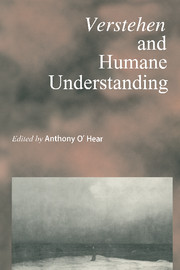Book contents
- Frontmatter
- Contents
- Notes on Contributors
- Preface
- ‘Two Cultures’ Revisited
- Rational and Other Animals
- Vico and Metaphysical Hermeneutics
- Three Major Originators of the Concept of Verstehen: Vico, Herder, and Schleiermacher
- Weber's Ideal Types as Models in the Social Sciences
- Verstehen, Holism and Facism
- Interpretation in History: Collingwood and Historical Understanding
- The Meaning of the Hermeneutic Tradition in Contemporary Philosophy
- Science and Psychology
- To Mental Illness via a Rhyme for the Eye
- Can There be an Epistemology of Moods?
- Feeling and Cognition
- Believing in order to Understand
- Data and Theory in Aesthetics: Philosophical Understanding and Misunderstanding
- Anti-Meaning as Ideology: The Case of Deconstruction
- Perictione in Colophon
- Index of Names
Preface
Published online by Cambridge University Press: 17 May 2010
- Frontmatter
- Contents
- Notes on Contributors
- Preface
- ‘Two Cultures’ Revisited
- Rational and Other Animals
- Vico and Metaphysical Hermeneutics
- Three Major Originators of the Concept of Verstehen: Vico, Herder, and Schleiermacher
- Weber's Ideal Types as Models in the Social Sciences
- Verstehen, Holism and Facism
- Interpretation in History: Collingwood and Historical Understanding
- The Meaning of the Hermeneutic Tradition in Contemporary Philosophy
- Science and Psychology
- To Mental Illness via a Rhyme for the Eye
- Can There be an Epistemology of Moods?
- Feeling and Cognition
- Believing in order to Understand
- Data and Theory in Aesthetics: Philosophical Understanding and Misunderstanding
- Anti-Meaning as Ideology: The Case of Deconstruction
- Perictione in Colophon
- Index of Names
Summary
The essays which follow are an attempt to explore the questions as to whether reason might take different forms depending on subject matter. More specifically, the contributors to the series—which formed the Royal Institute of Philosophy's annual lecture series for 1995–6—were interested in examining whether in the human world forms of thought and knowledge exist which, while not conforming to the patterns of the natural sciences, can nevertheless be thought of as expressing and adumbrating canons of rationality.
The first two essays, in contrasting ways, map out the territory. There then follow six essays, mainly devoted to examining the thought of various thinkers who since the eighteenth century have maintained that history and human action require forms of discourse and analysis not assimilable to the scientific. The remaining seven essays explore in more depth the requirements of realms such as the psychological, the theological, and the aesthetic, and the collection concludes with the latest of the recently unearthed Xanthippic dialogues.
- Type
- Chapter
- Information
- Verstehen and Humane Understanding , pp. vii - viiiPublisher: Cambridge University PressPrint publication year: 1997

